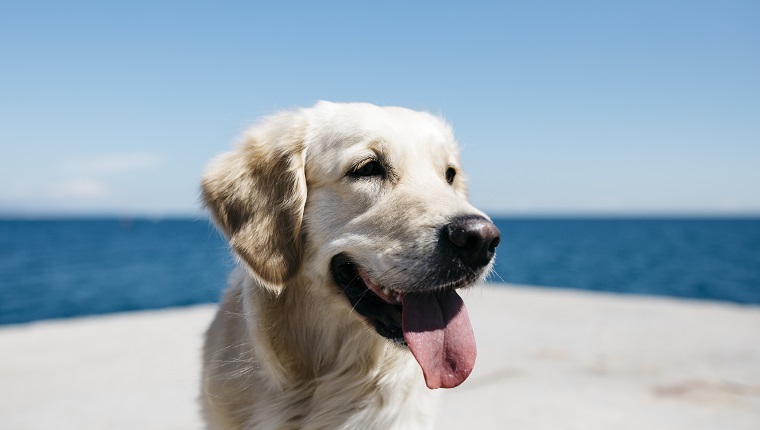During the summer days, we tend to sweat a lot under the sun. Our shirts or tank tops can sometimes be covered in sweat. But what about our beloved pooches? Do dogs sweat?
The quick answer is yes, dogs do sweat. Although, they don’t sweat exactly the same way we humans do.
Learning how dogs sweat and where they sweat from helps us understand how they cool off. It’s our job as pet parents to make sure our dogs stay comfortable and safe, and that means we need to know how their bodies work.
How Do Dogs Sweat?
Dogs don’t sweat the way we do. While we’re able to release sweat all over our bodies, our adorable pups cannot.
Dogs have two glands which produce sweat from certain areas in their bodies. These two glands are the merocrine gland and apocrine gland.
The merocrine gland is similar to our own sweat glands. But these glands are found in your dog’s paws, and they sweat to help them cool down. If you happen to be walking with your dog on a warm day and notice damp paw prints on the ground, that may be your pup sweating.
The apocrine glands are considered sweat glands by veterinarians, but they don’t serve the same purpose as merocrine glands, which help dogs cool off. The main purpose of the apocrine glands is to release pheromones all over your dog’s body, which helps other dogs identify them — as well as helping your dog identify others — through scent.
Another way your dog cools themselves down is by panting, which is a vital function of overall temperature regulation. When dogs inhale air through panting, they send cooler air into and around their body.
The other process by which dogs’ bodies keep cool is called vasodilation. This is when blood vessels expand and rise toward your dog’s skin where the external air cools them down. It’s pretty much your pup’s blood trying to cool itself off.
Signs Your Dog Is Too Hot

As you may have already noticed, your dog is covered in fur. Their coat may actually help them when they are out in the heat by blocking some sunlight and regulating their temperature.
However, this depends on the type of coat your dog has, and sometimes extra fur can cause them to overheat if they are out for an extended period of time without being given a chance to cool down.
Dogs bred for arctic conditions, like Siberian Huskies, may have more trouble staying cool in the heat.
Dehydration, being kept inside hot cars with no air flow, and even exercising at the peak of a hot day can lead to your dog overheating.
You may be able to tell if your dog is overheating if you see these signs:
- Excessive drooling
- Redness around the gums
- Tremors or shaking
- Labored, deep, and heavy panting
- High body temperature
- No energy
If you see these signs, get somewhere cool and out of the sun, and provide your dog with plenty of water. Call your vet. They may recommend further steps to cool your dog off or suggest you take your dog to an emergency vet depending on the severity of the symptoms.
How To Keep Your Dog Cool
Since our dogs can’t regulate their body temperature the way we do, we must always do our best to help them cool off, especially during hot days.
For instance, checking the weather can help you determine when you should take your dog out for their walk. If it gets hot at a certain time in the day, then walk them early in the morning or later in the evening when it starts to cool down.
Here are a few other ways to help keep your dog cool:
- Keep them indoors during the peak hot hours of the day
- Make sure your dog has access to cool, fresh water at all times
- If they are outdoors, make sure there is shade and monitor them for signs of heat stroke or overheating
- Never leave them inside your car, especially during hot days
- Give them a cool bath if they are outside
Have you ever seen your dog sweat from their paws? What are some ways you help your dog cool down? Let us know in the comments below!









